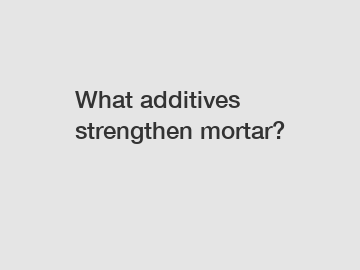What additives strengthen mortar?
What additives strengthen mortar?
Mortar is a vital component in construction projects, serving as a binding agent that holds bricks, stones, and other materials together. Although mortar is traditionally made from a combination of cement, sand, and water, there are various additives that can be incorporated to enhance its strength, durability, and resistance to environmental factors. In this article, we will explore the importance of these additives and their contribution to the overall performance of mortar.
1. Portland cement: The primary ingredient in mortar is cement, and specifically, Portland cement. This type of cement has advantageous properties that make it an excellent binder. When mixed with water, it forms a paste that hardens over time, creating a strong bond between the masonry units. Portland cement provides the initial strength to the mortar, ensuring its structural integrity.

2. Lime: Lime is a versatile additive that has been used in mortar for centuries. Lime mortar offers numerous benefits, such as increased workability, flexibility, and improved water resistance. By adding lime to the mix, the mortar becomes more plastic and easier to handle, making it ideal for intricate or delicate structures. Additionally, lime mortar allows for slight movement without cracking, which is particularly beneficial in areas prone to seismic activity.
3. Silica fume: Silica fume is a byproduct of the silicon and ferrosilicon alloy industries. When added to mortar, it acts as a pozzolan, a material that reacts with calcium hydroxide to form additional cementitious compounds. Silica fume greatly improves the compressive strength of mortar, making it more resistant to pressure and reducing permeability. This additive also enhances the mortar's resistance to chemical attacks, such as those caused by sulfates or chlorides.
4. Polymer additives: Polymer additives, such as acrylics or latex, can significantly enhance the properties of mortar. These additives improve the mortar's bonding strength, flexibility, and adhesion to various substrates. Polymer-modified mortars exhibit excellent resistance to cracking, impact, and freeze-thaw cycles. Moreover, they offer better durability and weather resistance, making them suitable for external applications, including rendering or plastering.
With the relevance and impact of additives in strengthening mortar established, it is important to consider their limitations and potential risks. Excessive use of additives, or the incorrect type of additive, can negatively affect the performance of the mortar. The proportions of each additive must be carefully balanced to avoid issues such as reduced workability, delayed setting time, or compromised bond strength. It is crucial to follow manufacturer guidelines and seek advice from experts to ensure the optimal use of additives.
In conclusion, additives play a crucial role in strengthening mortar and improving its overall performance. From traditional lime to modern polymer compounds, each additive brings specific advantages, such as increased workability, flexibility, and resistance to various environmental factors. By incorporating the right additives in the appropriate proportions, contractors can maximize the inherent strength and durability of mortar, resulting in long-lasting and reliable structures.
So, when it comes to strengthening mortar, the efficient utilization of additives can make a remarkable difference and help ensure the success of construction projects.
For more High Strength Cement Self-Leveling Compound, Buy Gypsum Self Leveling Compound| Kundu, Cement Based Self-Leveling Compound| High Performanceinformation, please contact us. We will provide professional answers.
165
0
0


Comments
All Comments (0)